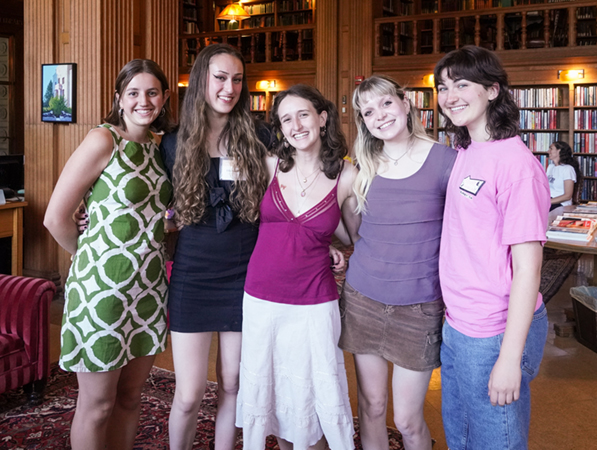

The Charlene Conrad Liebau Library Prize for Undergraduate Research honors students who create exceptional academic work using resources and materials from the UC Berkeley Library. This year’s winners combined intellectual curiosity and investigative rigor to illuminate new perspectives. From deconstructing dangerous stereotypes to uncovering overlooked immigrant histories, the students’ papers shed light on social issues across time and cultures, and advocate for change.

Ella Kirshbaum
Lower Division winner
In “The Seductress and the Hag: The Demonization of Women as Witches in Arthur Miller’s The Crucible and Beyond,” Ella Kirshbaum engages in a methodical literary analysis of the 1953 play, detailing the playwright’s use of exaggerated depictions of women in 17th-century Salem, Massachusetts, to criticize stereotyping as a means to justify persecution. Building upon that critique, Kirshbaum analyzes portrayals of women in 1950s America, illuminating the echoes of villainization across eras.
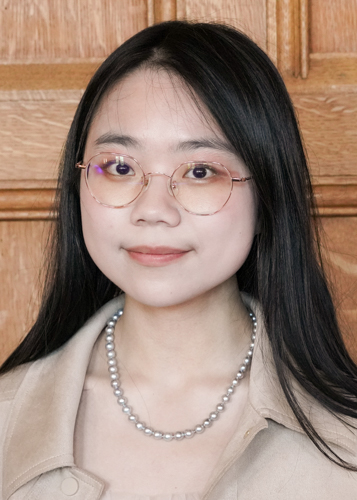
Xiyue Qin
Lower Division winner
Xiyue Qin’s paper, titled “Beyond the screen: Deconstructing the Orientalism towards Chinese women in films,” explores stereotypical portrayals of Chinese women in movies, and underlines a recent shift toward a more comprehensive depiction of these characters. The paper calls for even greater attention to be paid to showcasing a range of Chinese women’s experiences, with an emphasis on characters who resist traditional social identities, paving the way for a more inclusive film industry.
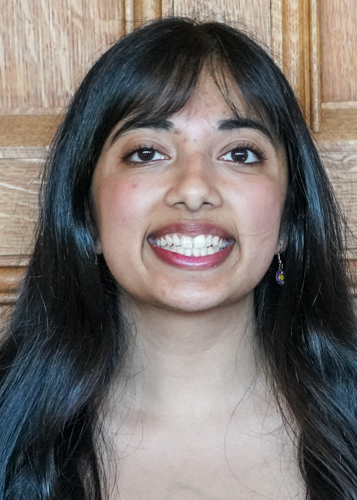
Ami Gandhi
Upper Division winner
Ami Gandhi’s meticulous research project, “Highlighting History, Cultivating Change: The Berkeley City Club’s Architectural Ingenuity, Preservation Ethos, and Activist Persona,” examines a local landmark, from its origins as a women’s club in the 1920s until today. Gandhi uses primary and secondary sources to argue that the club is a witness to and an actor in its surroundings, suggesting an interdependent relationship between its built environment and the sociopolitical contexts of its diverse eras.

Cynthia Rahman
Upper Division winner
Through extensive analysis of an array of print collections and digital archives, as well as a fieldwork experience in Bangladesh, Cynthia Rahman has created an original investigative work, titled “Governing Empowerment: ‘Second-Wave’ Feminism and Population Control Post-1971 War of Independence in Bangladesh.” The paper explores the complex intersection of second-wave feminism in the United States and severe population control measures in Bangladesh in the aftermath of the South Asian country’s war for liberation.
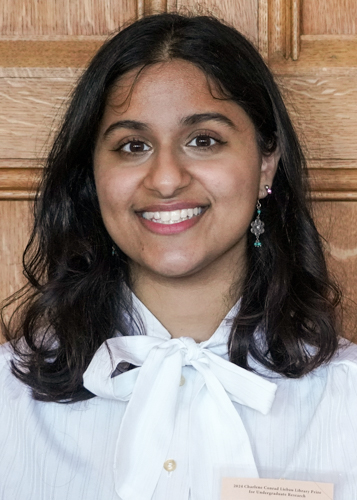
Sharanya Sahu
Upper Division winner
Using historical archives and census data, Sharanya Sahu shines light on the invisibilized South Asian community living in Stege (present-day Richmond), California, in the late 1800s and early 1900s. Sahu’s research project, “‘Hindu Toilers’ and ‘White Workmen’: South Asian Labor during the Urbanization and Industrialization of the Bay Area,” traces the origins of these immigrants and chronicles the challenges they faced as laborers in the development of the region.
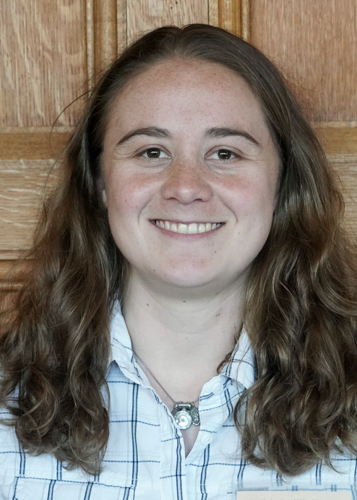
Alina Leticia Zárate
Upper Division winner
In “After Cesar, Se Puede: An Analysis of UFW Political Advocacy and Farmworker Justice in the 21st Century,” Alina Leticia Zárate investigates the efficacy of the famed union’s political advocacy since the death of Cesar Chavez in 1993. Drawing on interviews with union leaders, archival news releases, and legislative documents, Zárate demonstrates the need to reassess our understanding of contemporary farmworker justice and the evaluation of unions in these efforts.
Honorable mentions
Ariana Kretz
Upper Division
“‘We want you to listen to our words.’ A Case Study of Indigenous Parents’ Advocacy for their Children at the Carlisle Indian Boarding School, 1879 to 1918”
Kara Smale
Upper Division
“Diverse Pasts, Standard Futures: The Experience of Education in France from 1762 to 1789”